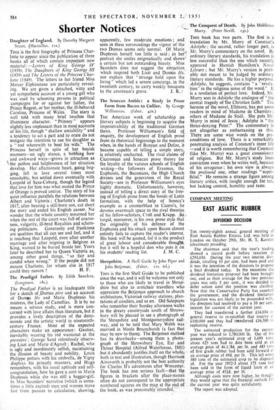THIS book has two parts. The first is a translation
by Mr. Murry of Constant's Adolphe ; the second, rather longer part, is Mr. Murry's commentary on the novel. By ordinary literary standards, his translation is less successful than the one which recently appeared in Hamish Hamilton's Novel Library ; but Mr. Murry's version is prob- ably not meant to be Judged by ordinary literary standards. He has a higher purpose. Adolphe, he suggests, contains " a revela- tion' in the religious sense of the word." It is a revelation of perfect love. Indeed, Mr. Murry sees in Adolphe the analogue of " the central tragedy of the Christian faith." The heroine of the novel, Ellenore, has put some readers in mind of Madame de Charriere ; others of Madame de Stael. She puts Mr. Murry in mind of Jesus ; Adolphe is " the thrice-denying Peter." The commentary is not altogether as embarrassing as this. There are some wise words on the pre- conditions of love. There is a remarkably penetrating analysis of Constant's inner life —and it is worth remembering that Constant (like Mr. Murry) was a great connoisseur of religion. But Mr. Murry's study loses conviction even when he writes well, because of his arrogance ; his own view is always the profound one, other readings " super- fidial." He remains a strange figure among literary critics, with insight enough for ten, but lacking control, humility and taste.


































 Previous page
Previous page